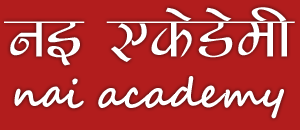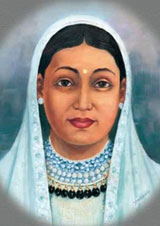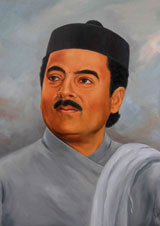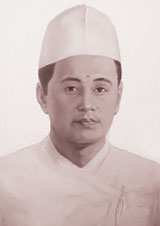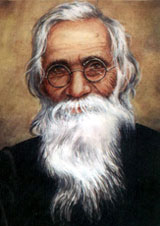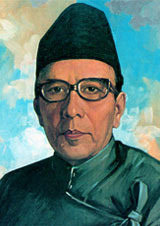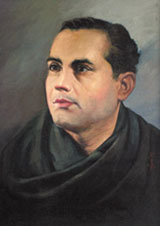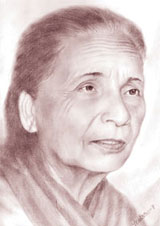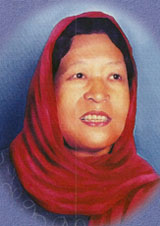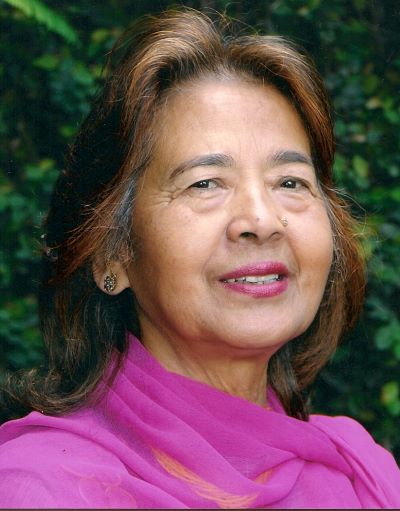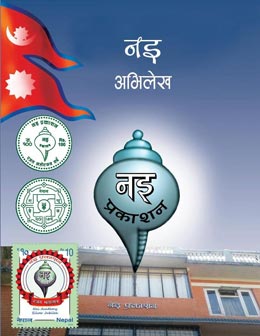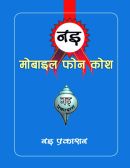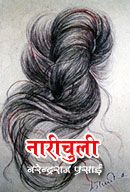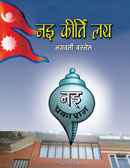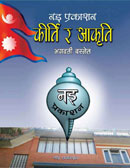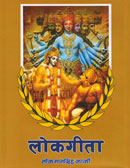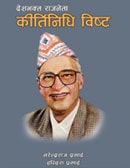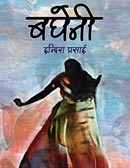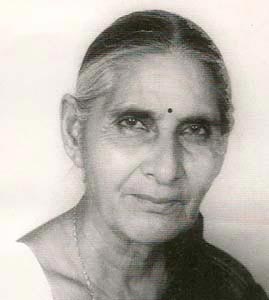
“Aja Desko Kranti Yudhma Hamro Yek Prakash Hos
Ladda Laddai Marey Maraula Yo Youta Nai Nara Hos!”
Sung by: Ranu Devi Adhikari; Lyrics and composition: Tarini Prasad Koirala
Ranu Devi Adhikari is one of those popular artists who made a
name for herself during the Rana regime. During her time as a singer Nepal was going through turbulent times with people united to overthrow the Rana reign.
She has been credited in playing a major role in encouraging Nepalis to fight for their rights by participating at the movement for democracy and through her songs. Her songs were frequently air played through Nepal Prajatantra Radio. This Radio station was established by the Nepali Congress in Raghupati Jute Mills, Biratnagar and Ranu Devi Adhikari songs were played constantly since her songs spoke about rights and strengthening of democracy in the country. In fact, she started singing in public only from then. That first song which she sang from the station was called “Nepali Aghi Bada Hathma Kranti Jhanda Le!” in 2006 BS.
During that era, a singing career was not taken positively and was not encouraged at all though songs were appreciated. The concept then was negative towards a singing profession and it was indeed a bold step taken by Ranu Devi Adhikari to further her passions. Thankfully, her songs were received very positively and she became a renowned artist. Her songs motivated many to fight for democracy. Since her songs were accepted by the society and the country in total, she was encouraged to sing even more.
“Juneli Raat Hajur
Gamkincha Bas Hajur
Fagun Ko Sheetal Batas!”
Sung by: Ranu Devi Adhikari; Composed by: Hiya Lal Mandal and Kalu Ram, Lyrics: Tarini Prasad Koirala
Since childhood, Ranu Devi Adhikari used to sing and she was the personal favorite of Tarini Prasad Koirala. It was none other than Tarini Prasad Koirala who worked constantly to bring Rani Devi Adhikari to the limelight and succeeded in it.
Ranu Devi Adhikari was not only a popular singer but also a respected teacher with tremendous knowledge. She was a source of inspiration for many…men and women. She was born on Mangsir 11, 1993 BS to Ishwori Prasad Upadhaya and Indira Upadhaya in Birgung. She got married when she was 13 years old to Tirtha Prasad Adhikari. It was only after her marriage that she started receiving education and also started singing professionally. It was none other than her husband who encouraged her to sing songs and also study at the same time. He supported her decision throughout and encouraged her to do things that everyone would be proud of. Later on she completed her studies till MA. Tirtha PrasadAdhikari was a perfect husband who always wished the best for his wife and her career. Without him, she would never have made it as confirmed by herself.
Ranu Devi Adhikari is the first female singer in Nepal who sang on the Radio and the person who inspired her to sing since her early days was none other than her own father, who was not only a music lover but also a genuine critic. It was only after having full faith in his daughter’s voice that he willingly asked her and encouraged her to do something worthwhile in music. The rest of her family members were also fine with that decision and later her husband, mother and father in law, all encouraged her to carry on further. However during that time it was more than difficult to give continuity to music and this must be the reason why with time she also stopped singing and persued her new profession as a teacher.
With time she started concentrating more on educating her son Abin and daughters Archana and Arpana. She was a teacher at Adarsha Balika Bidhyala, Biratnagar for many years.
She was no doubt an accomplished singer not only in Nepal but in India as well. Once she was even approached to sing for a Bollywood movie by the well-known musician S N Tripathi and was offered to sing Nepali songs on a radio station in Delhi which used to also operate Nepali programs. But due to her hectic schedules in school and her dedication to her profession she put down both offers.
by
Narendra Raj Prasai
Nepali to English
Translated by
Dipti Sherchan

